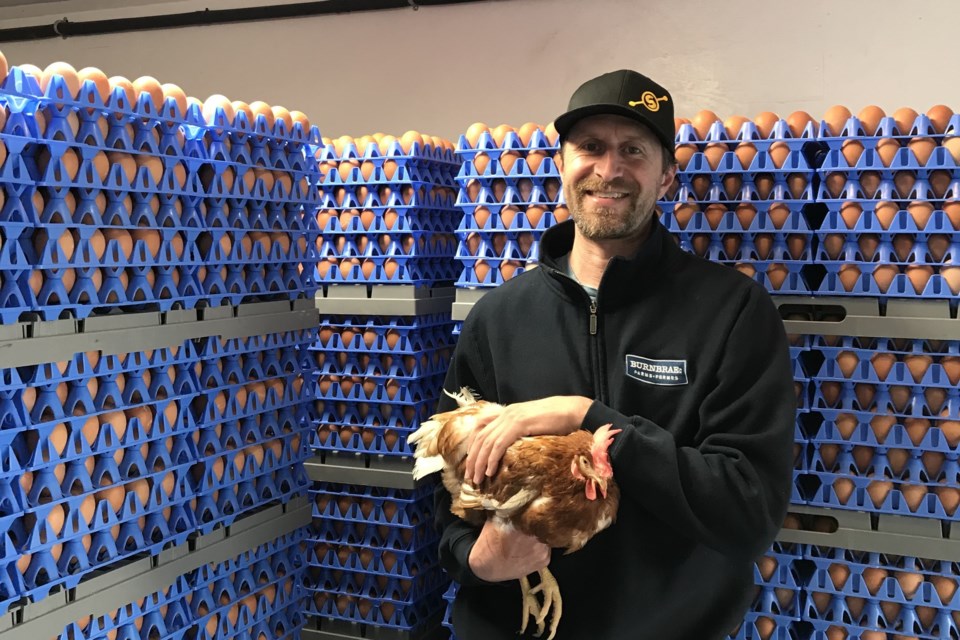When Scott Janzen reached 13 years of age, he told his father he would no longer help out on their family egg farm in Abbotsford, and he found a part-time job in town instead.
At the time, Janzen said he didn’t think he would one day become an egg farmer himself. Now, as a third-generation egg farmer who is working the fourth generation, he leads a 30,000-hen operation that produces millions of eggs a year.
“Now I’ve been doing this for almost 20 years, I wouldn’t trade it for any other job,” said the owner of Janzen Poultry. “Farming is a 24-hour job, 365 days a year, and I love every minute of it.”
More than 80 per cent of the 155 egg farms in B.C. are in Abbotsford and Chilliwack, collectively producing hundreds of millions of eggs each year, according to the BC Egg Marketing Board.
“The major egg graders in B.C. are in Abbotsford. But it’s also geography — the Fraser Valley is flat and it’s a good place for a farm, so traditionally farms of all kinds have sprung up there,” said Amanda Brittain, the BC Egg Marketing Board’s director of communications and marketing.
The rising pace of consumer demand for eggs has surpassed the pace of population growth in the province. More consumers are turning to cage-free eggs —including free-run, free-range and organic options — as well as enriched eggs such as those that include omega-3, according to Brittain.
“Eggs are still the most affordable protein in the grocery store. Also, with different cultural groups coming to B.C., they have different ways of eating eggs — [some] people might like eggs for dinner more often than they would eat it for breakfast,” she said.
In 2019, 27.5 million dozens of eggs—or 46 per cent of B.C.’s total egg production — were cage-free or enriched. In 2023, that number almost doubled to reach 52.1 million dozens, representing 61.5 per cent of the total production. This shift brings the province closer to achieving Canada’s goal of replacing all conventional cage hens by 2036, and according to BC Egg, B.C. leads the country on this metric.
Enriched eggs saw the largest growth in terms of their share of total production, rising from 6.4 per cent in 2019 to 30.1 per cent last year.
Janzen’s farm has expanded alongside growing demand. He said the farm’s number of chickens has almost doubled since he took over the farm in 2007 and that he now has around 30,000 chickens on his farm in Abbotsford and a second farm in Langley. Together, both farms produce tens of thousands of eggs every day.
Around 10 years ago, Janzen saw a change in consumer buying habits and converted his conventional farm to a free-range one. In 2018, he built another free-run barn. The difference is free-range chickens spend some time outside every day.
Every morning, Janzen goes to his barn with a cup of coffee and is greeted by the chickens who are able to run free and move up and down inside.
“We have a system called an aviary system, which allows the chickens to jump and to fly, we train them to do that. We’re able to have more birds and a smaller square footage because we have multiple levels,” said Janzen.
Under Canada’s supply management system, there is a quota of around 3.4 million hens for B.C., a limit that adjusts based on consumer demand. Farmers sell their eggs to grading stations, which distribute them to retail outlets, so farmers don’t compete with each other for sales.
Brittain said it’s a good business that requires a lot of work, and that it is common for egg farms to be passed from generation to generation in the Fraser Valley. But the field is not without its challenges.
“Farmers have been dealing with avian influenza for about two years now. It’s a huge challenge, especially when egg production is so concentrated in the Fraser Valley, and that means avian influenza can maybe spread faster than the farms that are more spread out,” said Brittain.
The number of eggs produced in B.C. dropped from 91.7 million dozens in 2022 to 84.6 million dozens in 2023 — the lowest level of production in the past five years, mainly due to hens lost to disease, according to the board.
Climate change is another challenge, as flooding, heat domes and forest fires push egg farmers to explore new ways to care for their birds, such as ventilation or sprinkler systems that keep chickens cool, according to Brittain.
Janzen said the increasing cost of land is another hurdle for farmers looking at expansion.
“There’re always challenges and most farmers take those challenges and put their head down and continue to work. That’s how we’re built. We always make it through and we’ll actually hold each other’s hands going through the hard time,” he said.
Janzen and his fellow farmers started an egg giveaway program during the pandemic that has donated nearly 30,000 dozen of eggs to people in need. This won him the Business Excellence Award from the Abbotsford Chamber of Commerce in 2022.
“I truly love what I do,” said Janzen.




